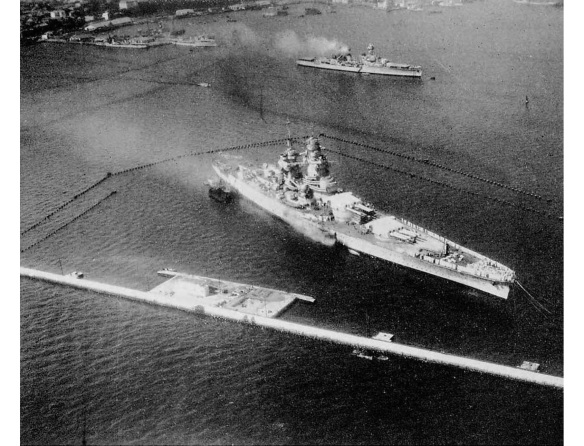THE BATTLESHIP RICHELIEU, a light cruiser (probably the Montcalm) and a colonial sloop in the harbor of Dakar prior to the Anglo-Free French attack on September 23, 1940.
A major naval base and commercial port, Dakar in West Africa had been in French hands since 1659, although France did not extend its possession to include the interior of the country until 1865 and French West Africa did not become a colonial entity until 1895. In contrast to the situation in the Mediterranean, the British did not simply want to secure the surrender of French warships at Dakar or have them immobilized, they also wanted to ensure that the port itself was not taken over by the Germans or the Italians as that would provide a convenient base from which to attack British convoys on their way to the Cape. The Cape route was important, but became even more so as the war continued after the Mediterranean became all but impassable for convoys from early 1941. Dakar also had the only dockyard between Gibraltar and the Cape.
After their experiences in North Africa, an attack was made on Dakar on 8 July. As at Oran and Mers-el-Kébir, the attack was by aircraft flying from the elderly and diminutive carrier Hermes accompanied by two heavy cruisers providing gunfire. The battleship Richelieu was hit, but was not put out of action.
An attempt to take Dakar was made in September. On 31 August 1940, 2,700 Free French troops and 4,200 British troops sailed from Liverpool under the command of Major General N. Irwin with Vice Admiral John Cunningham in command of the naval force. Accompanying the force was the leader of the Free French, General Charles de Gaulle, even though it was known that he would not be welcomed by the Vichy forces holding Dakar who would regard him as a franc-tireur, essentially an outlaw and outside the protection of the Geneva Conventions if taken prisoner.
Perhaps there were some grounds for optimism. The former German colony of Cameroon had been mandated to France under the Treaty of Versailles, and had tried to repudiate the armistice between France and Germany. Vichy forces had intervened, but a bloodless coup d’état in August had seen the French Cameroons aligned with the Free French.
Surprisingly, de Gaulle was not the main instigator of these moves to gather the French colonies around the Free French cause. Instead it was the work of a Major (later Lieutenant General) Philippe Leclerc, the nom de guerre of Captain Viscount Philippe de Hauteclocque, who had been among the first to rally to de Gaulle’s side in London. De Gaulle had promoted Leclerc to major and sent him to rally support for the Free French in West Africa and Equatorial Africa. Leclerc had organized the successful coup in the Cameroons and then in the French Congo.
At this stage in the war, with the Vichy regime still largely an unknown quantity and the Free French still establishing themselves, British intelligence about the new Vichy regime in France was very poor, and far worse almost to the extent of being non-existent about the situation in the French African territories.
The Vichy regime was not content to accept the loss of its African colonies. Unknown to the British, as the Anglo-French force was leaving Liverpool a Vichy French cruiser squadron managed to leave its home port of Toulon in the south of France and slip out of the Mediterranean on its way to the Cameroons. The cruiser squadron was intended to return the Cameroons to Vichy control and support the Vichy authorities in Gabon, but it also put into Dakar. When the British discovered this, Churchill, realizing the dangers, wanted to recall the Dakar force.
Confusion between the naval commander in Gibraltar, Admiral Sir Dudley North, and the Admiralty in London as well as Somerville in command of Force H, had enabled the Vichy cruisers to leave the Mediterranean without being challenged. North had earned a sharp reprimand after he had protested about the action at Mers-el-Kébir, and had then been ordered to avoid incidents with the Vichy French. He allowed the French cruisers to slip through the Straits of Gibraltar believing that had the Admiralty wanted them stopped, it would have ordered Force H to intercept them. The Admiralty, on the other hand, did not know that the French ships were at sea.
By contrast, lax security on the part of the Free French in London meant that the Vichy regime soon knew that a combined Free French and British force had left Liverpool, although they did not know the destination. Before the force arrived off Dakar, on 19 September six Vichy cruisers attempted to escape from Dakar but were confronted by ritish warships. Two returned to Dakar, another two surrendered and were escorted to Casablanca, while the other two escaped.
Churchill had thought that the arrival of the Anglo-Free French force off Dakar would persuade those ashore to join the Free French, but the element of surprise was lost completely when de Gaulle broadcast just before the arrival, alerting the governor and the military commanders. Worse still, when the force finally arrived on 23 September, instead of finding Dakar basking in tropical sunshine, it was shrouded in fog. When Free French officers went ashore to negotiate the surrender of the garrison they were made unwelcome, with the battleship Richelieu opening fire as did the port’s own artillery batteries, badly damaging an elderly British battleship and a cruiser.
